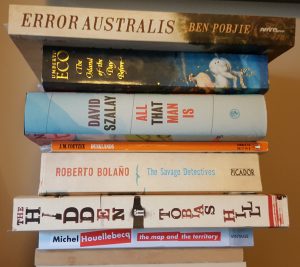Managed to get through a few chunky books this time around, though sadly there were a few self indulgent doozies amongst them. And a few unfinished ones too.
Houellebecq’s The Map and the Territory was a great, if slightly depressing read. It’s not hard to think that many elements of this are autobiographical, especially those about his dying father and his lament about his own failing libido / interests and health. His trademark hedonism is all present, but what makes this book stand out is its more reflective tone, despite plenty of laughs along the way. A melange of observations about modern life (French Tourism; Mercedes A Class vehicles; the financial madness of the Art world) in moments I didn’t expect, and even better, a book that kept surprising me. Probably a 5 star book for me (or close).
Fifty pages into The Hidden by Tobias Hill, a book that had sat unread for five years at home, I knew I was in for another real treat. There were visceral elements that reminded me of Tim Winton or Christos Tsiolkas, and a sense of impending tragedy (McEwan), plus the small group claustrophobia of Golding. I just thought it went on a little long and lost the tension of the earlier part of the book, though the chapter-flipping between modern day Greece and Spartan history was effective. Still a remarkable novel, and a writer I will seek out again. 4 stars.
About a third of the way through Bolano’s The Savage Detectives, I remembered that similarly in 2666, there was a monstrously relentless (and almost endless) section of the book documenting forty or fifty murders of Mexican women who fell fowl of local officials, or who just happened to be around when the cartel chiefs wanted to demonstrate their cruelty to scare off foes. Though not as gruesome as the earlier novel, the 400 page bulky midsection of this book is seemingly designed to wear you down in the same way, via interviews of people coming into contact with our two mad poets Arturo Belano and Ulisis Lima over 25 years of worldwide travels. The book is a loving, scattergun series of recollections about a brief period in Mexico when poetry meant everything to young writers and Viceral Realism was “a thing”. The final section is a harrowing hunt for the founding mother of this genre and whilst I applaud its wackiness and indulgence, I simply couldn’t recommend the book due to length concerns. It still largely won me over – 4 stars.
Well, there’s finally a Coetzee book that I didn’t want to endure, and it was his first and shortest – 1974’s Dusklands. I only managed to get to the end of the first novella and found myself thinking I’d rather move on. What a shame as his later books were so good. 1 star.
Without question I was drawn to David Szalay’s All that Man Is by the maps on the front dust jacket, and (I think) a review in The Age or The Guardian. I found the stories intriguing to begin with, in particular the second one in which the hapless Bernard finds himself trapped with an overweight mother and daughter at an overseas holiday resort. Towards the middle of the book the stories became more angry; materialistic and career driven men and their insensitivities in full flight. The internal lives of young to old men (in sequence) are lovingly examined in small slices, each believable and beautifully described. Well worth the read if you can forgive the stage-prop role of many of the female characters. 4 stars.
Stuck in Woopi, with all the time in the world to pick something long or tough, I lucked out on Foucault’s Pendulum, so grabbed Umberto Eco’s The Island of the Day Before. What a terrible mistake that was; rarely have I found a book so infuriating and circular. Fooled by the Gulliver’s Travels adventure / man finds himself shipwrecked in odd place premise, Eco then digresses to alchemy, explains the cultural relevance of Doves, inset with expositions about longitude and scientific history. Somewhere amongst the 510 pages, there’s meant to be a story, and then it turns out, he’s been writing an imaginary story all along and pretty soon you really don’t care if he ever sees his Orange Dove. Eco is no doubt a clever man, but shouldn’t bore the pants off us needing to prove it. I think I said that about David Foster Wallace in a review of the Infinite Jest too. 2 stars.
I feel so sorry for Ben Pobjie (Melbourne’s Own), as I think he’s a smart guy, and his book Error Australis is often funny, particularly in the absurd chapter quizzes, but heck, reading it made me physically exhausted. I pretty much had to put it down every couple of chapters due to the relentless gag count, and I feel sick thinking about how many hundreds and hundreds of hours he’s put into writing it, only for me to want to bin it or give it to a smart nephew who wouldn’t ever read the Fatal Shore. If I ever need to light a fire, this is the first book I will use as kindling. 2 stars.
